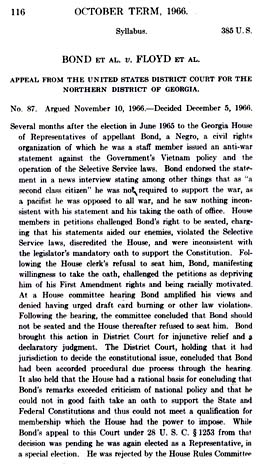
U.S. Supreme Court. BOND et al. v. FLOYD et al. Washington, D.C.: GPO, 1966.
SuDoc No.: JU6.8:385
Case No.: 385US116
Date Argued: November 10, 1966
Date Decided: December 5, 1966
 View full text
View full text
Julian Bond was elected by a margin of 2,320 to 487, to the Georgia
House of Representatives in a special election held in June of 1965.
On January 6, 1966, only four days before he was to be sworn in, the
Student Non-Violent Coordinating Committee (SNCC) issued one of the
first anti-war statements by a major civil rights organization. In
the statement, SNCC compared the deaths of civil rights workers in
the U.S. with deaths of the Vietnamese at the hands of the U.S.
government. The SNCC statement then related the situation to the
draft,
"We therefore encourage those Americans who prefer to use their energy
in building democratic forms within this country. We believe that work
in the civil rights movement and with other human relations
organizations is a valid alternative to the draft. We urge all
Americans to seek this alternative, knowing full well that it may
cost their lives -- as painfully as in Viet Nam."
After Bond (member and co-founder of SNCC) endorsed the anti-war
statement, the Georgia House responded by voting in the opening
hours of its legislative year (January 10, 1966) to bar Bond from
taking his seat. They justified the vote (184-12) in several petitions
calling Bond's endorsement of the SNCC statment, and other statements
he made against the draft, as:
"totally and completely repugnant to and inconsistent with the
mandatory oath prescribed by the Constitution of Georgia for a
Member of the House of Representatives to take before taking his
seat."
Contradicting this view, Bond, in an interview given directly after
he was refused the oath, stated:
"I stand here with intentions to take an oath - that oath they just
took in there - that will dispel any doubts about my convictions or
loyalty."
Bond then took the matter to the judicial system, eventually landing
the case before the U.S. Supreme Court. Later the Justices would note
Bond's willingness to take the oath. The oath, which came from the
Georgia State Constitution, stated:
"Each senator and Representative, before taking his seat, shall take
the following oath, or affirmation, to-wit: 'I will support the
Constitution of this State and of the United States, and on all
questions and measures which may come before me, I will so conduct
myself, as will, in my judgment, be most conducive to the interests
and prosperity of this State.'"
Though the Supreme Court recognized that the House could
constitutionally insist members take an oath, it ruled that the
Georgia House violated Bond's First Amendment rights when it
refused Bond his seat because it felt he could not take the oath
"sincerely."
"But this requirement, [to take the oath], does not authorize a
majority of state legislators to test the sincerity with which
another duly elected legislator can swear to uphold the Constitution.
Such a power could be utilized to restrict the right of legislators to
dissent from national or state policy or that of a majority of their
colleagues under the guise of judging their loyalty to the
Constitution. Certainly there can be no question but that the First
Amendment protects expressions in opposition to national foreign
policy in Vietnam and to the Selective Service system. The State
does not contend otherwise. But it argues that Bond went beyond
expressions of opposition, and counseled violations of the Selective
Service laws, and that advocating violation of federal law
demonstrates a lack of support for the Constitution. The State
declines to argue that Bond's statements would violate any law if
made by a private citizen, but it does argue that even though such
a citizen might be protected by his First Amendment rights, the State
may nonetheless apply a stricter standard to its legislators. We do
not agree."
The majority opinion in Federal District Court, which received the
case prior to the Supreme Court, made clear that Bond and his
endorsement of the SNCC statement touched upon racial fears, both
at home and abroad. It called the anti-war statement:
"...a call to action based on race; a call alien to the concept of
the pluralistic society which makes this nation. It aligns with the
organizations with '...colored people in such other countries as the
Dominican Republic, the Congo, South Africa, Rhodesia....' It refers
to its involvement in the black people's struggle for liberation and
self-determination....' It states that 'Vietnamese are murdered
because the United States is pursuing an aggressive policy in violation
of international law.' It alleges that Negroes, referring to American
servicemen, are called on to stifle the liberation of Viet Nam.
The call to action, and this is what we find to be a rational basis
for the decision which denied Mr. Bond his seat, is that language
which states that SNCC supports those men in this country who are
unwilling to respond to a military draft."

|

